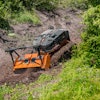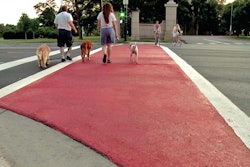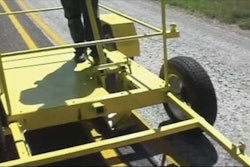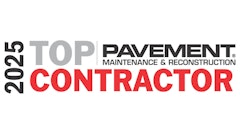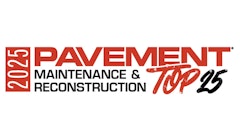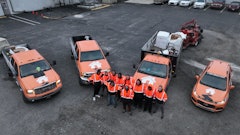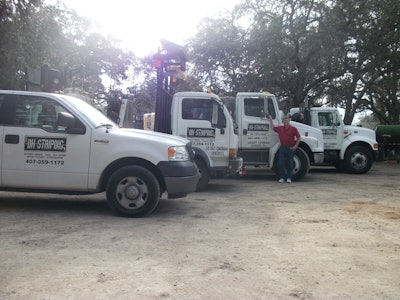
Over the course of the past several years contractors have had to make adjustments in order to survive the struggling economy. Joe Campolong, owner of DH Striping located in Orlando, FL, is one contractor that found success by shifting the focus of work to fit the trending client needs.
The company began in 1986 and was purchased by Campolong in 2004. Over the course of nine years, he has grown the company from 14 employees to the current 24 employees. DH Striping offers services including 70 percent paint work, 15 percent signage, 10 percent sealcoating and maintenance, and 5 percent thermoplastic.
Smaller services, such as installing detectable warning mats, once weren’t an issue, but Campolong has added them to the company’s working list. Another change Campolong has made since purchasing the company was the pursuit of other customers. “The company originally didn’t do a whole lot of restripe work or pursued retail outlets or big box centers,” he says. “That is something we have been semi-forced to implement due to the economy.”
Despite the low numbers of the past few years, DH Striping has had a pretty good 2012. “Our sales have been fairly consistent through the course of the recession,” Campolong says. “The problem is the margins are nowhere near where they were prior to the recession. Our sales price has come down substantially the past three years while our materials, labor and fuel costs have all gone up.”
DH Striping has also seen a significant change in the type of clients’ work has been completed for such as the shift from new construction striping to a majority of restripe projects. “Through 2008 we were 90 percent new construction pavement marking,” he says. “Since the economy has been slow and new construction has slowed, we are now at 60 percent restripe work.”
With the significant decline in new construction work they have also had to expand their service area. “Prior to 2008 we were completing 90 percent of our business as new construction work, equally divided between paint markings, thermoplastic markings and signage. With 90 percent of that work being within a 100 mile radius, but this year we’ve traveled as far as Mississippi to complete work.”
DH Striping was hit hardest during the recession when it wasn’t paid for completed work. “A big thing that hurt us was the work we completed right at the end of the good times,” Campolong says. “Some of the customers we completed the work for went bankrupt so there was a lot of bad debt.”
Because of the bankruptcies with previous clients, Campolong has decided to become more particular about what customers to complete work for. “We’re going to pick and choose our customers better rather than chasing every job,” he says. “We’re going to try to make sure we pursue customers that place a value on the service we provide. Through the recession even good customers became price sensitive and priced you out. This happened even when they realized other companies didn’t provide the services we provide; they still wanted us to match the price. Now that things are settling out a little the customers realize that the additional service commands an additional price.”
Campolong strives to maintain a high level of customer satisfaction. “The level of customer satisfaction we pursue makes us unique,” he says. “If the customer doesn’t currently understand the scope of the services we will educate them on it. If something is wrong with the plans, for example if it doesn’t meet government specifications, we will bring it to their attention.”
As for the future, Campolong wants to make sure the economy and industry is stable before doing any significant changes. “I think we’ll be much more conservative going forward than in the past,” he says. “We’ll look for continued profitability versus the growth mode many people were in prior to the recession.”



